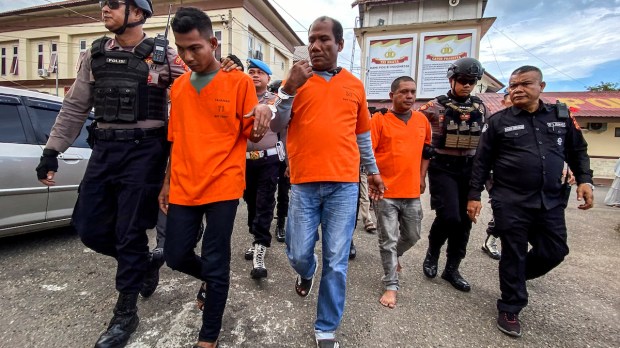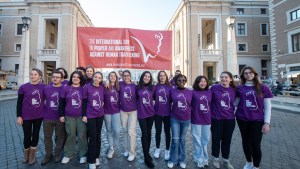Human trafficking has become such a big and lucrative business that traffickers can get pretty creative in covering their tracks, according to the Vatican’s representative to the United Nations.
So those fighting trafficking have to up their game.
Thus the title of a United Nations conference: “Innovative partnerships to end trafficking in women and girls: the Santa Marta Group model,” which the Permanent Observer Mission of the Holy See to the UN co-organized with the Republic of the Philippines and the Santa Marta Group.
The Santa Marta Group (SMG) is an alliance of police chiefs and bishops from around the world working with civil society to eradicate human trafficking.
The forum took place on the sidelines of the 68th Commission on the Status of Women, which has been running from March 11-22, 2024, examining the theme “Accelerating the achievement of gender equality and the empowerment of all women and girls by addressing poverty and strengthening institutions and financing with a gender perspective.”
Cardinal Vincent Nichols, archbishop of Westminster, is president and chairman of the SMG. Addressing the UN forum in a prerecorded video, Cardinal Nichols said his interest in the subject began when he met a woman from the north of England who had been trafficked into prostitution in Italy. But it was a “nudge from Pope Francis” that led him to found the SMG in 2014.
“Trafficking in human beings is a grave evil which cries out for justice,” said Archbishop Gabriele Caccia, Permanent Observer of the Holy See to the United Nations. “Millions of our brothers and sisters around the world experience this terrible crime, a crime to which the poor and the vulnerable are particularly at risk.”
He cited a 2022 UN Office of Drugs & Crime “Global Report on Trafficking in Persons” that found that women and girls account for approximately 60% of detected victims, and that they are more likely to experience violence at the hands of their traffickers. They also make up the vast majority of victims trafficked for sexual exploitation, “a particularly heinous form of violence with long term physical, mental, and spiritual wounds,” the archbishop said.
“We cannot achieve equality between men and women while some women and girls are treated as objects to be used and discarded,” Caccia said.
How the Church helps
The archbishop, a native of Milan, said that the Catholic Church’s unique position as an institution “both global in scope and profoundly local in character means it is well-placed to connect actors across many sectors, including the many religious organizations doing essential work on the ground to identify and support victims.”
Kevin Hyland, former head of Scotland Yard’s human trafficking unit, is strategy director for the SMG. He said that trafficking has gotten worse over the past seven years, while interventions have remained stagnant or declined. Some 50 million persons are currently being trafficked around the world, according to Hyland, and 99.98% of trafficking crimes remain undetected. Yet “only one in every 8,700 victims will see justice,” he said.
Sister Abby Avelino, a Maryknoll sister who is international coordinator of the anti-trafficking organization Talitha Kum, said there is no other choice for many people trapped in conflict areas than resorting to traffickers to flee from hunger, desperation, and threats.
“Women and girls and young people are particularly at risk of trafficking and exploitation, and this is happening for many reasons,” Sister Abby said. “Forced marriage, online sexual exploitation of children cases is continually increasing. Traffickers are increasingly recruiting online, where younger generations have a strong presence.”
They work among us
Some speakers at the forum emphasized that victims of trafficking are working in the midst of people’s everyday lives. Hyland spoke of women and men exploited and abused on farms in Southern Europe for fruit sold in major supermarkets, and a woman who was sold three times and exploited as a domestic worker in affluent UK homes. In one of those homes, he said, she was “raped by the man in the house when his wife was out,” he said.
Colm Noonan, Detective Chief Superintendent in An Garda Síochána, Ireland’s National Police Service, which is collaborating with the SMG, said he and his colleagues are seeing “labor exploitation … in every single village, in every single town, and it’s in every single city.”
“We have just in the last week successfully investigated a labor exploitation case and the victims of human trafficking there are working in the agri-food businesses, right in our communities,” Noonan said.
Part of the Irish National Police’s work is raising awareness, Noonan said, “to try and get into those communities and ask people: Do they recognize what’s going on? Do they see people who aren’t forming part of the community, who are bused in and out of their workplace, who are not people that we can readily communicate with, and how do we support those people?”
He said there are victims of trafficking in “the carwash they’re going into, the nail bar that they’re using, the cafe that they’re using.”
A holistic approach
Hyland, of Scotland Yard, said the SMG “brings a unique partnership between leaders in criminal justice, faith groups, business, government and civil society.” To combat trafficking, he said, “we need a new approach … one that recognizes this as serious crime with integrated prevention.”
“Being ambitious must become the norm,” he said. “As a police officer, I recall being told I could never seize criminal assets in Thailand – until I did. Or that international sanctions could not be imposed on Libya’s traffickers – until they were. The state and its agencies have to introduce strategies that make it nigh impossible to traffick people, and if you do, you will face an almost certainty of being prosecuted.”
Hyland outlined Santa Marta’s “priority pillars,” the first of which focused on finances. Governments and businesses must be more vigilant to ensure that when they hand out contracts or enter into deals, they do not inadvertently fund criminal traffickers.
Further, he said, law enforcement agencies must target ill-gotten profits and benefits in order to remove the incentive. This applies not only to traffickers but also those who benefit from trafficking, even unknowingly or through “willful blindness,” such as landlords of properties where sex trafficking crimes occur.
“If you make money from human trafficking or modern slavery, even unwittingly, there needs to be a notion that you lose it,” Hyland said.
He also urged regulation and policing of the internet and “transactions on the virtual highway.”
“If pedophiles, traffickers, fraudsters or any other serious criminals peddled their wares on the streets, shops, and highways of the US, they would be pursued and brought to justice,” he reasoned. “Technology, digital, and social media companies have the technology and ability to do far more in prevention.”
Further, it’s important for policy makers and law enforcement agencies to realize that human trafficking and modern slavery destabilize economies, national security, and the safety of communities. Trafficking is used to fund terrorist groups, for example. Traffickers recruit child soldiers, and trafficking for human organs is increasing.
“National Intelligence and international intelligence gathering bodies have a role in fighting this crime,” he concluded, suggesting that airlines be compelled to notify law enforcement of red flags such as multiple one-way flights for women and girls using the same IP address or payment card.
Greater funding
Finally, Hyland urged greater funding to fight trafficking, saying G20 member countries must collectively invest $30 billion annually in the fight against human trafficking and modern slavery by the year 2030.
“This might sound like an incredible sum, but it is just a fraction of the $150 billion profit that criminals make,” he said.
Abby Jae Wilhelm is an attorney and Senior Policy Advisor with Hogan Lovells, an international commercial law firm that has supported the SMG and other anti-trafficking organizations. She said that through its pro-bono work in this field over the past 15 years, the firm has learned three key lessons: disruption, confiscation, and reparation.
“The pursuit of convictions for trafficking is paramount, but it is not an end in itself,” Wilhelm said. “Justice for survivors requires disrupting the business of trading human beings.”
In addition, “perpetrators must be held to account through confiscation of the proceeds of crime they generate for their participation in this trade,” she explained. “This requires law enforcement to conduct systematic financial investigations of the perpetrators. This inevitably means that there must be better cross border collaboration and investment in law enforcement financial investigation teams. And that, of course, is a matter for government.”
Finally, Hogan Lovells has come to appreciate that reparation for survivors of trafficking is “fundamental to regaining their sense of dignity and to avoid being re-trafficked,” she said.
That matters, Wilhelm said, because otherwise, “we are further permitting the financing of organized crime.”



